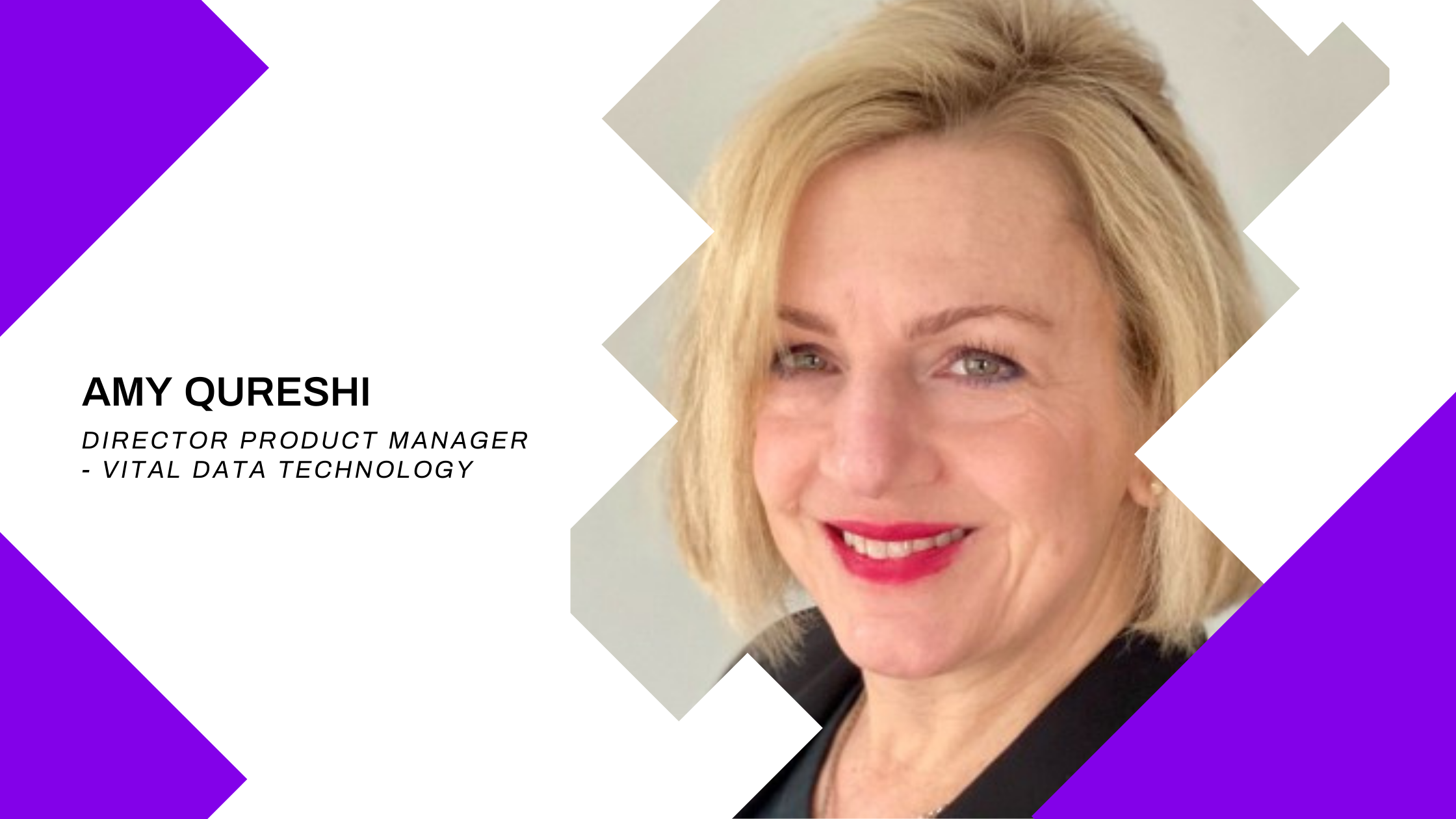Since the pandemic started and health technology got the spotlight, many more nurses are interested in a career in Nursing Informatics. However, a lot of nurses are not quite sure what it is or what Informatics Nurses do. A decade ago, as I considered my career, I was fortunate to have several Informatics Nurses to speak to. But not everyone has that luxury.
This is a new series on Writing the Future of Health where we will interview practicing Informatics Nurses. We will learn about what they do, how they made the transition into a health technology career, and any lessons for nurses considering the switch.
Our second Informatics Nurse is Amy Qureshi of Vital Data Technology. Thank you, Amy!

What is your current job title and company?
I am the product manager for Care Management and Utilization Management products for Vital Data Technology, a small California-based health technology company. We have a strong bench in data science, and along with a HEDIS certified product for managed care organizations and an HCC risk product, we do proprietary risk modeling and analytics work. I was hired to commercialize and make generally available our care management offering so we have a competitive suite of solutions on the market.


How would you describe your role?
My role isn’t one that a nurse would jump into straight from nursing. For me it’s been a journey of 20 years in roles doing business analysis in the context of software implementation and new product features, doing consulting projects and a variety of other operational roles in healthcare and health IT.
A Product Manager for a software vendor is responsible for understanding the market opportunity and customer need and building a roadmap of software solutions and features. That travels from understanding the stakeholders and the users of the solution, through identifying functional and data needs, to breaking that body of information down into requirements for software development.
As the software moves through its cycle, we frequently validate its design, asking, ‘Does it do what we intended it to do?’ We then enable our organization to support customers, roll it out to the market, and evaluate the customer experience as they provide feedback. That software solution then continues to be enhanced and evolved.


How do you collaborate with customers and get their input as you work?
That’s my favorite question because I jokingly say, ‘Any job like this is easy if you’re lazy, because if you get the customers talking, they tell you what you really need to do.’
Sometimes collaborating with customers takes a direct form – a customer may have a specific enhancement they desire, and your organization has agreed to develop it and partner closely with them. More often, you’ll see customer collaboration in the form of a Client Advisory Group, where you might be meeting with the group on a regular basis and vetting ideas, screens, functions or priorities with them.
It’s a critical part of ensuring the solution meets customer needs with value and appeal. It’s also an activity that requires strong facilitation and communication skills, and decision-making skills – because if you aim to satisfy everyone 100%, you’ll never get software delivered.

What is your typical day like?
My current company is a little over 50 employees, to provide context, so it can sometimes be crazy – flexibility is key in a growing organization. My days may be a mix of Product Management meetings with my peers discussing issues and goals that we have as a team, meetings with business analysts and developers, and squeezing in time between meetings to do anything from research on a new standard to documenting “user stories”, which are part of envisioning and defining a feature.

Another part of my day may simply be responding to client needs or issues. Their concerns could be anything from challenges with the existing software meeting when there are changes in their operations, requests for enhancements to match new programs or contracts they will be starting, or software bugs or defects. In a small organization, it’s often “all hands on deck” to ensure customers’ needs are being met fully and promptly.

Can you tell me a bit about your career background before this role?
I’ve been either working for software companies or in consulting for the last twenty years. But I have a fun story as to how I landed in technology.
I was a nurse at Children’s Hospital of Philadelphia for several years, ending up in case management. At that time, case management in the hospital environment was new and the practice was evolving.

I was really interested in the business aspect of that work, making that work meaningful, putting good processes in place, and process improvement. My mindset was very clear to my boss, who was a wonderful leader and mentor. One day she said to me, “Amy, I think you should work for my husband’s company”, which was a software company.
I would like to think she wasn’t trying to get rid of me! Joking aside, there was a need in the company at that time for clinical knowledge in their workforce. You can still find that today, software companies that have a lot of technical bench strength but not necessarily a strong clinical or business presence.
I was so fortunate to have had that manager have my career’s best interests in mind, and I am grateful to this day. Having mentors, and being a mentor, is an important part of navigating your career.

Before your boss mentioned it, had you ever considered a nursing career in technology?
Technology was not front and center for me. This pre-dates the whole EMR explosion that came with the Affordable Care Act/Meaningful Use incentives, so nurses weren’t pushing around COWS, the computers on wheels.

Do you have any lessons learned from making that transition into health technology? Was there any kind of learning curve?
For any significant transition like that, learning curves are big. My immediate reaction to this question is that yes, the curve is big but big learning curves should not be intimidating. I think a lot of it is your own approach to this kind of endeavor – a change in career should be approached with curiosity and a commitment to learning.
Be curious, and take the opportunity to learn the things that you need to learn. Research your interests – there’s a lot of information available in the public domain information, and plenty of industry associations for the sector you’re interested in pursuing. There are also many low or no-cost opportunities you can find online for learning – for example, if you’re interested in being a clinical/business analyst, you can research the role and find online coursework.

Once you start on that path, if you find yourself in a position that doesn’t feel right after a while or it’s not compelling you – keep in mind, technology is not singular. The health technology sector is wide – there are data analytics, workflow applications, content delivery, and more organizations that need clinically experienced team members.

Over the last 20 years of your experience, what would you say was your biggest lesson learned or a good nugget of information that was an ‘aha’ moment for you?
Well, ‘aha’ moments still happen today. This may not be an ‘aha’ moment, but a striking difference between a nurse’s role in patient care and a role in technology is that in technology, you are a team member whose work has a lot of interdependencies. You’ll interact with people with very different areas of expertise – and learn from them. For me, I find that I continue to do my job better because of all I’ve learned from other people. For example, I’ve not learned how to be a software developer, but by working with and listening to software developers, I’ve learned a lot about how to define requirements, how to think about data relationships, and more.


What do you like most about your career now?
What I like about my career is what has always excited me in any job, which is change. Technology is often a vehicle for change in an organization, for doing work or getting information in a new and better way. Nurses who are going to explore technology can find exciting Nursing Informatics jobs right in their own organization – their health system, their managed care organization, whatever – where they’ll work with the broader organization and likely with part of the organization they’ve never interacted with before.
I personally have loved working for technology vendors because I get to hear what everyone across the country is thinking about, sometimes in other countries. I get to hear what people want to do in the future with their healthcare delivery and improve what they’re doing now.


Do you ever miss bedside nursing?
Yes. Sometimes as a software vendor or in consulting you will do a ‘chair side,’ where you work-side-by-side with a nurse to understand a process. That’s when I feel the urge to kind of elbow her or him aside and say, ‘Oh I want to do that!’ But that’s what a clinician brings to a technology role – a feel for a walk in the customer’s shoes that others without clinical experience don’t have.
I also have more knowledge to share, that I gained through work in different segments of the industry. So now, I can assist people in a different way than patient care – like hearing my neighbor’s frustration over her confusing medical billing statement, knowing what kind of glitch probably happened, and giving her tips on how to resolve it.

What advice do you have for nurses thinking about careers in health technology?
My advice is to take yourself up on your own curiosity. Go ahead and explore – if it’s not for you, you can always go back to patient care with a little different experience under your belt. And, if you take that first step from nursing to technology, your path may likely change again within technology.

Is there anything else you think would be helpful for nurses considering this career path?
Actually there is – it’s important to keep in mind that this is a transition into a world where your work is measured significantly differently than what you do in Nursing. It is a business environment, and you do need to think about yourself as a business person as well as a nurse.

It’s also not usually hourly work. Your day flows differently, and can be unpredictable. So while you may hear about flexible work hours in technology, you need to be flexible too – there may be times when you need to work extra hours or outside of usual hours.
That’s not meant to be a turn-off – just to help prepare my nurse colleagues in joining me!






0 Comments